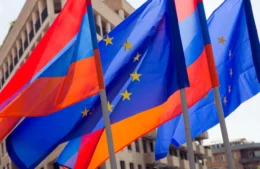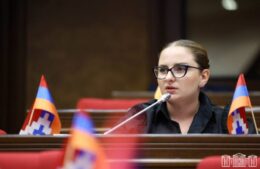State Department’s Panic over Genocide Bill Shortsighted
- (0)
BY ARA KHACHATOURIAN
“Any U.S. determination of the events of 1915 as ‘genocide’ would set off a political firestorm in Turkey, and the effect on our bilateral relationship – including political, military, and commercial aspects – would be devastating,” a cable recently released by the whistleblower site WikiLeaks quotes the US Ambassador to Turkey as saying in 2010.
In the same cable, while then US Ambassador James Jeffrey criticizes Turkey’s preconditioning of a Karabakh conflict resolution to its ratification of the Turkey-Armenia protocols, he insists that future relations with Armenia will be linked to the Genocide issue.
In reviewing a recent trove of documents released by WikiLeaks, it appears that US officials in Turkey, and subsequently the State Department, had fallen prey to the Turkish denial machine and pursue a shortsighted effort of continuously warning Washington about the negative impact of a Genocide resolution on US-Turkey relations.
Earlier this month, Asbarez reported on another cable, dated January 2010, quoting US Ambassador to Turkey, James Jeffrey as saying that the fate of the Turkey-Armenia protocols will have the most “profound effect” on the Turkey-US relations.
In a cable dated August 2009, the US Deputy Chief of Mission, Doug Silliman says: “The number one threat to U.S.-Turkish bilateral relations is if the USG [US government] or Congress were to endorse a resolution labeling the World War I Armenian tragedy a genocide.” The cable is what is called a “scenesetter” prior to a scheduled visit by former Congressman Robert Wexler (D-Fla.) to Turkey. In it Silliman advises the Wexler, who chaired the US-Turkey Congressional Caucus before resigning in 2009, that “Turkey’s best defense against a resolution would be to normalize relations with Armenia as soon as possible.”
Immediately after the 2006 mid-term elections, when Democrats seized power in Congress, then US Ambassador to Turkey, Ross Wilson, wrote to warn the State Department that “there is rising concern here that the U.S. Congress will approve an Armenian genocide resolution for the first time in 2007. This would have a deleterious effect on our relations, and could endanger support Turkey provides for our efforts in Iraq.”
“In the immediate aftermath of the U.S. midterm election, Turks started to raise with Embassy officials questions regarding the possibility of a sense of the Congress resolution recognizing the Armenian Genocide. This remains a neuralgic issue in Turkey,” Wilson told the State Department in the cable dated November 6, 2006 in preparation for the arrival of the Connecticut Republican Rep. Chris Shays’ delegation to Turkey.
“When a similar resolution nearly made it to the House floor in November 2000, when U.S.-Turkish relations were on excellent footing, their Ambassador had his bags packed, ready to leave; other sanctions were under consideration. When the lower house of the French parliament passed a law in October that would criminalize denial of an Armenian Genocide, reaction in Ankara was strong, though measured. While the bill has yet to become law, Turkish-French bilateral mil-mil relations are currently frozen and trade has suffered,” warned Wilson.
“We believe reaction to a U.S. Congressional resolution would be considerably stronger. In an election year — 2007 features both presidential and parliamentary elections in Turkey — with nationalist feelings running high, reaction likely would be swift and retaliatory, despite our efforts over the past 18 months to put our bilateral relationship back on even footing. Examples of actions that would damage our regional priorities: We could be denied use of Incirlik Air Base, which currently serves as a hub to move close to 60% of air cargo to Coalition forces in Iraq. Habur Gate on the Turkey-Iraq border is also a key transit point for sustainment fuel for our troops, as well as for Iraq in general. Any slowdown or cut-off there would hurt U.S. warfighters in Iraq,” added Wilson in the 2006 cable.
A similar alarm was sounded on August 8, 2007 by the then Deputy Chief of Mission to the US Embassy in Ankara, Nancy McEldowney.
“House passage of an Armenian genocide resolution would likely jeopardize U.S. national security interests in Turkey and Iraq, complicate the security environment for U.S. citizens and USG [US Government] personnel, and work against those in Turkey calling for open discussion on the tragedies of 1915,” McEldowney asserted.
“The USG [US Government] has worked hard to encourage a candid discussion in Turkey of the tragedy suffered by ethnic Armenians during World War I. The Turkish and Armenian governments have discussed establishing joint commissions of academics and historians to establish the facts, in parallel with efforts to establish official bilateral relations. The January 2007 murder of Turkish Armenian journalist Hrant Dink has contributed to growing calls for changes to Penal Code Article 301, which criminalizes insulting ‘Turkishness,’ and stifles Turks, ability to discuss fully the events of 1915. A U.S. Congressional resolution labeling this tragedy a ‘genocide’ would trigger an intensely negative and nationalist response, and would work against those in Turkey calling for a comprehensive review of the events and for normalizing bilateral relations with Armenia,” claimed the Embassy official, adding “A resolution would also have negative consequences for U.S. national security interests in Iraq and elsewhere.”
The most glaring example of this State Dept. paranoia and kowtowing to Turkish denialist rhetoric comes in a cable by then US Ambassador Ross Wilson in the immediate aftermath of the October 10, 2007 passage of the Genocide Resolution by the House Foreign Affairs Committee.
After briefing the State Department about the reaction in Turkey and official government statements and response, Wilson reported: “As of 1300 local October 11, there has been no change that we can determine in the Turkish Armed Forces’ security posture in southeastern Turkey, which continues at a high counter-terrorism ops tempo.”
In a blatant expression of cowardice Wilson said: “The long holiday weekend will temporarily lower our profile.”
It appears that successive US representatives in Turkey have become the harbingers of their host country’s propaganda, rather than the true defenders of the democracy, human rights and justice, for which the US stands.
In recent hearings the latest nominee for the US Ambassadorial post in Turkey, Francis Ricciardone, has demonstrated that the same pattern still continues. We have also seen the same in Azerbaijan, where the US Ambassador there, Matthew Bryza, acts more like an Aliyev advisor than a US envoy.
If only Armenia were so lucky to get a US Ambassador who represents the historical truth and does not parrot a shortsighted US State Department policy.
It had one, but he got fired when he spoke the truth!



















